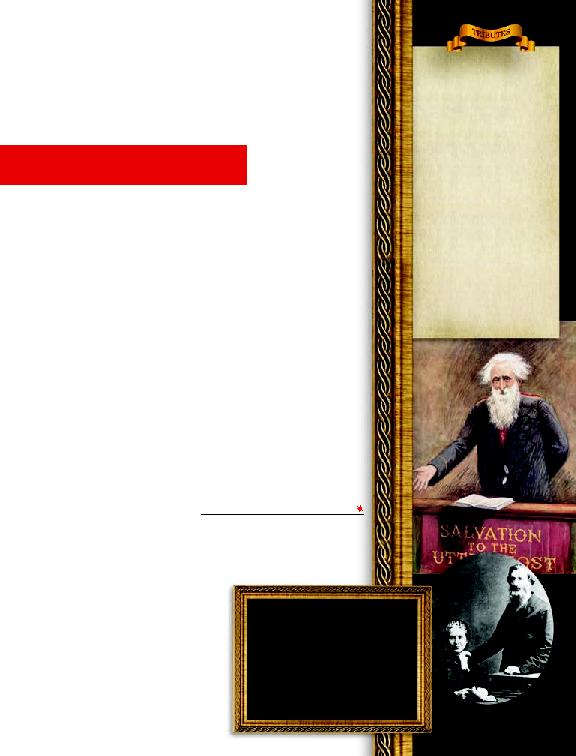
in open sewers, and opium dens
and bars were everywhere. His
heart was touched by those ad-
dicted to drugs and alcohol, the
"worst of the worst." So on a steamy
hot day in July 1865, William stood
the East End of London and read
a few lines from the Bible, only to
be egged by a customer of the bar.
He marched home through the
muck, passing flower sellers, pros-
titutes and starving children on
the way. He reached home at mid-
night and told Catherine, "Darling,
I've found my destiny."
to reach the outcasts that other
churches couldn't help, convert them
to Christianity and then lead them
to established churches. But as the
fledgling Christian Mission grew
larger than Booth had expected,
new converts chose not to join the
mainline churches because they did
not fit in socially with the people.
known to stay up all night compos-
ing letter after letter, his poor scribes
waiting patiently in the hall, ever
ready to send off his missives. But
if he had a smart phone, he would
have been able to quickly send all
officers words of encouragement
and the latest updates of his plans.
The story of him sending a telegram
with only the word "Others" (to em-
phasize what the Army's concern
should be) wasn't real, but with a
smart phone he could have texted
everyone instantly!
at his notes. He wouldn't have
He would systematically create
subject headings for his talks, and
then dictate an address to a short-
hand writer. After it was typed,
he would review his speech and
edit it several times. This process
rize his talks and elim-
inated the need for
notes when he spoke.
hard, dirty and exhausting, often
taking weeks to reach such faraway
places as America, Australia and
California. Airplanes would have
made transportation incredibly
easier for the Founder, especially
during his six visits to America
between 1886 and 1907. And rather
than spending days on trains and
boats, he could have jetted off to
the Holy Land or Canada in a
matter of hours. That would not
only have saved time but would
have been much less taxing on
the General's health.
Victorian England, and used all the
current ideas to preach the gospel
and to help those most in need.
Imagine what he might have done
with the tools and means of today!
Canon Newbolt: ...the commanding
genius, the resolute determination,
and unsparing devotion of William
Booth had forced their way to the
front of public opinion, in spite of
obloquy and sometimes of oppo-
sition. William Booth had firmly
laid hold of the great truth, from
which he never swerved, that to
raise submerged man one must
deal with his spiritual as well as
his bodily and mental condition.
age might do well to notice while
it praised what was noble in the
man and enthusiastic in his work.
A religious and benevolent life,
such as that of William Booth, still
had power to excite the approbation
of men and lift them up from things
temporal to things eternal.
violence, ridicule, sarcasm and slander
could put in his way was overcome. By
the help of the Almighty he built a
bridge over which multitudes have passed
from despair to hope, from the edge of
the pit to the threshold of Heaven.